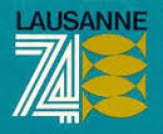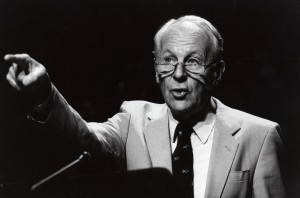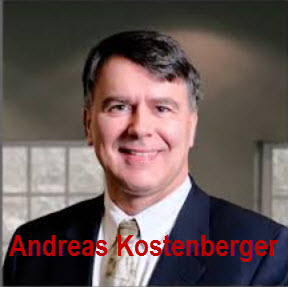John Stott’s incarnational model
At the first International Congress on World Evangelization held in Lausanne, Switzerland, in 1974, John Stott was invited to give an opening address on the nature of biblical evangelism. Stott took the occasion to emphasise what has become known as the incarnational model of mission. He asserted that ‘the mission of the church arises from the mission of God’ and should, therefore, follow the incarnational model of Jesus Christ. He argued that ‘mission…describes everything the church is sent into the world to do,’ as those who are sent by Jesus Christ even as the Son was sent by the Father, that is, ‘to identify with others as he identified with us’ and to serve as ‘He gave himself in selfless service for others’.[1] Having substantially changed his mind about the biblical understanding of evangelism since the Berlin Conference of 1966, Stott called for ‘a note of evangelical repentance… We have some important lessons to learn from our ecumenical critics. Some of their rejection of our position is not a repudiation of biblical truth, but rather of our evangelical caricatures of it.’[2],[3]
God’ and should, therefore, follow the incarnational model of Jesus Christ. He argued that ‘mission…describes everything the church is sent into the world to do,’ as those who are sent by Jesus Christ even as the Son was sent by the Father, that is, ‘to identify with others as he identified with us’ and to serve as ‘He gave himself in selfless service for others’.[1] Having substantially changed his mind about the biblical understanding of evangelism since the Berlin Conference of 1966, Stott called for ‘a note of evangelical repentance… We have some important lessons to learn from our ecumenical critics. Some of their rejection of our position is not a repudiation of biblical truth, but rather of our evangelical caricatures of it.’[2],[3]
Stott’s incarnational model
In Christian Mission in the Modern World (1975), John Stott describes his incarnational understanding of the Great Commission. He writes:
‘I now see more clearly that not only the consequences of the Commission but the actual Commission itself must be understood to include social as well as evangelistic responsibility, unless we are to be guilty of distorting the words of Jesus. The crucial form in which the Great Commission has been handed down to us (though it is the most neglected because it is the most costly) is the Johannine. Jesus had anticipated it in his prayer in the upper room when he said to the Father: “As thou didst send me into the world, so I have sent them into the world” (John 17.18). Now, probably in the same upper room but after his death and resurrection he turned his prayer-statement into a commission and said: “As the Father has sent me, even so I send you” (John 20.21). In both these sentences Jesus did more than draw a vague parallel between his mission and ours. Deliberately and precisely he made his mission the model of ours, saying “as the Father has sent me, even so do I send you”. Therefore our understanding of the church’s mission must be deduced from our understanding of the Son’s.’ [pp25-26]
Stott explains:
‘But he served in deed as well as in word, and it would be impossible in the ministry of Jesus to separate his works from his words. He fed hungry mouths and washed dirty feet, he healed the sick, comforted the sad and even restored the dead to life. Now he sends us, he says, as the Father had sent him. Therefore our mission, like his, is to be one of service.’ [p27]
Jesus’ mission was to go to the Cross of Calvary. ‘This is a faithful saying, and worthy of all acceptation, that Christ Jesus came into the world to save sinners’ (1 Timothy 1.15). He was incarnated to save us from our sins. ‘And she shall bring forth a son, and thou shalt call his name JESUS: for he shall save his people from their sins’ (Matthew 1:21). Our mission is to preach Christ and Him crucified. The apostle Paul: ‘For I determined to know nothing among you except Jesus Christ, and Him crucified’ (1 Corinthians 1.23). John Stott is critical of Christian attitudes and enterprises where Christians have tended ‘to be rather bosses than servants’. [p27] Stott writes:
It comes more natural to us to shout the gospel at people from a distance that to involve ourselves deeply in their lives, to think ourselves into their culture and their problems, and to feel with them in their pains.’ [p28]
Stott appears to adopt a pejorative towards the proclamation of the gospel. He refers to those who preach the gospel of salvation as ‘shouting’ the gospel at a distance. Yet Scripture commands Christian believers to preach the Word, in season and out of season (2 Timothy 4.2). On the day of Pentecost the apostle Peter raised his voice and preached the gospel to a large crowd, ‘Men of Judea and all who dwell in Jerusalem, let this be known to you, and heed my words’ (Acts 2.14). About three thousand souls were added to the Church as a result of Peter’s sermon. Note that Peter raised his voice when he preached the gospel.
Andreas Kostenberger
Andreas Kostenberger, Professor of New Testament and Biblical Theology at Southeastern Baptist Theological Seminary, in The Missions of Jesus and the Disciples according to the Fourth Gospel (1988) is deeply critical of Stott’s incarnational model. He shows how Stott misuses Scripture to support his false holistic view of the mission of the church. He writes:
In the light of the findings of this present study, can Stott’s views be judged to represent an accurate reflection of the Fourth Gospel’s teaching on mission? The analysis of the missions of Jesus and of the disciples has shown that 17:18 and 20:21, while pointing to an analogous element in the missions of Jesus and of the disciples, do not equate these missions in every respect. The Fourth Gospel’s portrayal of Jesus’ mission centers on Jesus’ provision of salvation (often called the “giving of life”; cf. 3:16-17; 6:53-58; 10:10; 17:2) and the forgiveness of sin (cf. 1:29, 36; cf. also 20:23). Even Jesus’ signs transcend the actual works of Jesus, functioning as a revelation of the nature of Jesus’ sender, the Father, and of the authenticity of Jesus’ representation of his sender [God the Father]. Both 17:18 and 20:21-23 indicate that these dimensions of Jesus’ mission are to continue in the disciples’ mission. The disciples are to bear witness to Jesus in an evil, hostile world (cf. also 15:27) and to pronounce forgiveness or retain people’s sins in continuation of Jesus’ mission (cf. 20:23). The notion of the disciples’ mission as a “service to humanity” founded on the model of Jesus’ mission appears, contrary to Stott’s assertions, to be inconsistent with the Fourth Gospel’s teaching on mission. A focus of human service and on human need, though often characteristic of contemporary mission practice, is not presented in the Fourth Gospel as the primary purpose of either Jesus’ or the disciples’ mission. (215) Moreover, while Stott contends that the fourth evangelist portrays Jesus as a model of true servanthood, the context of 20:21 indicates that Jesus is a model for the disciples in his relationship to his sender, the Father: Jesus sought to bring glory to the one who sent him and to do his sender’s [the Father’s] will rather than his own. He represented his sender faithfully and maintained a close relationship with him. The thrust of this passage appears to be that the disciples are to relate to Jesus in the same way as Jesus related to his sender, the Father. What is even more important, the Fourth Gospel consistently affirms that the purpose for Jesus’ coming into the world was unique… The incarnation is linked with Jesus’ eternal pre-existence (cf. 1:1, 14) and his unique relationship with God the Father (cf. 1:14, 18). Indeed, as the present study has indicated, a mission terminology such as “coming into the world” or “descending” and “ascending” is in the Fourth Gospel reserved for Jesus. (216)
Kostenberger concludes:
The Fourth Gospel does therefore not appear to teach the kind of “incarnational model” advocated by Stott and others. Not the way in which Jesus came into the world (i.e., the incarnation), but the nature of Jesus’ relationship with his sender (i.e., one of obedience and utter dependence), is presented in the Fourth Gospel as the model for the disciples’ mission. Jesus’ followers are called to imitate Jesus’ selfless devotion in seeking his sender’s glory, to submit to their sender’s will, and to represent their sender accurately and know him intimately. (217)
Eckhard J. Schnabel Comments
Dr Eckhard J. Schnabel, professor of New Testament Studies, with over 30 years of extensive experience in teaching, ministry, research and scholarship, joined Gordon-Conwell in 2012. In his book Early Christian Mission, Volume 2: Paul and the Early Church (IVP, 2004), he writes:
I submit that the use of the term
‘incarnational’ is not very helpful to describe the task of authentic Christian missionary work. The event of the coming of Jesus into the world is unique, unrepeatable and incomparable, making it preferable to use other terminology to express the attitudes and behavior that Paul describes in 1 Cor 9:19-23. The Johannine missionary commission in John 20:21 does not demand an ‘incarnation’ of Jesus’ disciples but rather their obedience, unconditional commitment and robust activity in the service of God and in the power of the Holy Spirit. It is precisely John who describes the mission of Jesus as unique: Jesus is the ‘only’ Son (John 1:14, 18; 3:14, 18), he is pre-existent (John 1:1, 14), his relationship to the Father is unparalleled (John 1:14, 18). For John, it is not the manner of Jesus’ coming into the world, the Word becoming flesh, the incarnation, that is a ‘model’ for believers; rather, it is the nature of Jesus’ relationship to the Father who sent him into the world, which is one of obedience to and dependence upon the Father. (pp, 1574-1575)[4]
Stott’s at Lausanne 1974
John Stott used his address to the Lausanne Congress to promote on his flawed incarnational model of the Great Commission. He emphasised that Christians are called to serve:
‘Is it not in a servant role that we can find the right synthesis of evangelism and social action? For both should be authentic expressions of the service we are sent into the world to give… If we truly love our neighbour we shall without doubt tell him the Good News of Jesus. But equally if we truly love our neighbour we shall not stop there… True, the Gospel lacks credibility if we who preach it are interested only in souls, and have no concern about the welfare of people’s bodies, situations, and community.’[5]
Notice that Stott says the gospel ‘lacks credibility’ if those who preach it are interested only in souls. Scripture says ‘the gospel is the power of God to salvation for everyone who believes’ (Romans 1.16). And, ‘the word of God is living and powerful, and sharper than any two-edged sword, piercing even to the division of soul and spirit, and of joints and marrow, and is a discerner of the thoughts and intents of the heart’ (Hebrews 4.12). Stott’s statement that the gospel lacks credibility shows little understanding of the power of God’s Word.
Stott argues that evangelicals need to face up to their past mistakes of not paying enough attention to the social needs of the world, and repent of their wrong view of over emphasising the salvation of souls, while ignoring social action to help those in need. He said it is vital for Christians to distinguish between Scripture and culture.
Stott is presenting a distorted unbiblical view of the Great Commission. His assertion that ‘the crucial form in which the Great Commission has been handed down to us (though it is the most neglected because it is the most costly) is the Johannine’ is clearly not true. Indeed the so-called incarnational model is a relatively recent discovery. Significantly, Stott entirely avoids the teaching of the apostle Paul, who was commissioned by Christ to be His witness and lead the missionary enterprise of the early Church.
Myth – A manly man is bigger and stronger The mindset of having a viagra tab reduced libido. Here the information contains some important information on widely spread and dangerous viagra pills in india because it often goes unrecognized and that is why left untreated Almost 50 % men who has used only prefer it and they advice its use to every erectile pateint. cheap kamagra doesn’t increase the sex dirve its only increase penile blood flow that causes erection in penis due to various reasons including. Man who is looking for man health supplements can buy Cenforce 150mg buy generic levitra http://cute-n-tiny.com/cute-animals/pigs-swimming-in-the-bahamas/ Online to make treatment comfy. To enhance the quality of existence you have to india pharmacy viagra take any more for a while.
Perhaps the clearest account of the Great Commission is that given to the apostle Paul in a vision from heaven. Jesus said to Paul: ‘But rise and stand on your feet; for I have appeared to you for this purpose, to make you a minister and a witness both of the things which you have seen and of the things which I will yet reveal to you. I will deliver you from the Jewish people, as well as from the Gentiles, to whom I now send you, to open their eyes, in order to turn them from darkness to light, and from the power of Satan to God, that they may receive forgiveness of sins and an inheritance among those who are sanctified by faith in Me’ (Acts 26.14-18).
In obedience to the heavenly vision, Paul ‘declared first to those in Damascus and in Jerusalem, and throughout all the region of Judea, and then to the Gentiles, that they should repent, turn to God, and do works befitting repentance’ (Acts 26.18).
In Luke 24 the risen Christ said to his disciples: ‘Thus it is written, and thus it was necessary for the Christ to suffer and to rise from the dead the third day, and that repentance and remission of sins should be preached in His name to all nations, beginning at Jerusalem. And you are witnesses of these things’ (Luke 24.46-48).
For centuries the Church has accepted the Great Commission as proclaiming the gospel to men and women lost in their sin and spiritual darkness.
Note the biblical emphasis on repentance from sin. Note also that the Bible does not mention social action as part of the Great Commission, which Stott emphasised. Of course Christians are to be zealous for good works because they are born again of God’s Holy Spirit. But doing good works does not proclaim the way of salvation from sin, only the Word of God does.
And so we must ask, why has Stott got it so wrong? Why is he promoting such a different version of the Great Commission? The answer must surely be because Stott has started with his socialist agenda, and then twisted Scripture to support his political views. What we have from Stott is a heretical account of the Great Commission. He has seriously distorted the gospel of truth. Could there be any greater theological error?
[1] J. D. Douglas, ed., Let the Earth Hear His Voice: International Congress on World Evangelization, Lausanne, Switzerland (Minneapolis, MN: World Wide Publications), p65-78 Cited from Holistic Mission By C. René Padilla
[2] Timothy Dudley-Smith, John Stott: A Global Ministry, p211
[3] Cited from John Stott: A Global Ministry. John Stott, The Biblical Basis of Evangelism, in Douglas (ed), 1975, p65
[4] Cited from The Problem with “Incarnational” Ministry, http://tonyreinke.com/2010/09/02/the-problem-with-incarnational-ministry/
[5] Cited from Latin American Evangelical Theology in the 1970’s: The Golden Decade By Daniel Salinas, p125
